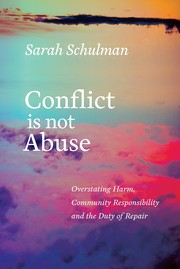Esther reviewed Conflict is not abuse by Sarah Schulman
Conflict is not Abuse, reviewed Apr 2022
1 star
(Copied from an old twitter thread, Apr 2022)
Oof, this book is a slog to get through. Not to mention the many fundamental flaws.
For example: the whole chapter about how she believes communication is overly restrictive today is written from a place of deep fear of messing up and an inability to read social queues. Thereby doing the thing she warns about in the book: overstating harm.
I can’t say the book is written from a neurotypical perspective because I don’t know that about the author. I would say though it is written assuming a neurotypical perspective and audience.
A lot of the difficulties she describes are common among various neurodivergencies but instead of exploring that she denies these perspectives as overly sensitive.
Her insistence of in-person talking over text communication also shows a generational divide. It’s understandable that she’s not super fluent in …
(Copied from an old twitter thread, Apr 2022)
Oof, this book is a slog to get through. Not to mention the many fundamental flaws.
For example: the whole chapter about how she believes communication is overly restrictive today is written from a place of deep fear of messing up and an inability to read social queues. Thereby doing the thing she warns about in the book: overstating harm.
I can’t say the book is written from a neurotypical perspective because I don’t know that about the author. I would say though it is written assuming a neurotypical perspective and audience.
A lot of the difficulties she describes are common among various neurodivergencies but instead of exploring that she denies these perspectives as overly sensitive.
Her insistence of in-person talking over text communication also shows a generational divide. It’s understandable that she’s not super fluent in asynchronous communication but she doesn’t acknowledge this. Instead she generalizes her perspective and dismisses alternatives.
Another fundamental mistake is the assumption that conflict and abuse are a strict binary and mutually exclusive, as if both can’t exist simultaneously in messy overlaps and interconnections. A lot of the book is built on this assumption and therefore on very shaky ground.
And she continues to bring Israel and Palestine into this, for no good reason really, which I’m not qualified to unpack but the way she uses it and the discourse about it as an example in various places feels contrived at best.





